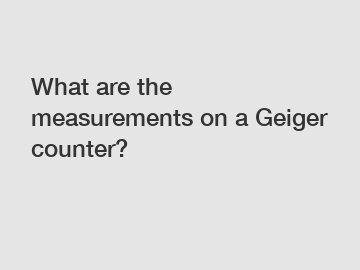Apr. 04, 2024
Geiger counters are essential tools for detecting and measuring ionizing radiation. This device uses a Geiger-Muller tube to detect and measure radiation levels accurately. Understanding the measurements on a Geiger counter is crucial for anyone working in environments where radiation exposure is a concern. In this article, we will explore the various measurements on a Geiger counter and their significance.
**Types of Measurements on a Geiger Counter**.
There are several important measurements on a Geiger counter that users should be familiar with:

**Counts per Minute (CPM)**.
Counts per minute (CPM) is a measurement of the number of radiation events detected by the Geiger counter in one minute. This measurement is used to indicate the intensity of radiation in the environment. The higher the CPM reading, the greater the level of radiation present.
**Counts per Second (CPS)**.
Counts per second (CPS) is another measurement used to quantify radiation levels. It is similar to CPM but provides a more granular and immediate measurement of radiation events. CPS is often used in situations where real-time monitoring of radiation levels is necessary.
**Microsieverts per Hour (µSv/h)**.
Microsieverts per hour (µSv/h) is a measurement of radiation dose rate. It indicates the amount of radiation exposure a person would receive in one hour at a specific location. This measurement is essential for assessing the potential health risks associated with radiation exposure.
**Milliroentgens per Hour (mR/h)**.
Milliroentgens per hour (mR/h) is another unit of measurement used to quantify radiation dose rate. It is commonly used in the United States as a measurement of radiation exposure. Like µSv/h, mR/h provides crucial information about the potential health risks associated with radiation exposure.
**Alarm Thresholds**.
Geiger counters are often equipped with alarm thresholds that can be set by the user. These thresholds indicate when radiation levels exceed a certain predefined limit. When the radiation levels reach or exceed the set threshold, the Geiger counter will emit an audible or visual alarm to alert the user.
**Significance of Measurements on a Geiger Counter**.
Understanding the measurements on a Geiger counter is essential for maintaining a safe working environment in areas where radiation exposure is a concern. By monitoring CPM, CPS, µSv/h, and mR/h readings, users can quickly assess radiation levels and take appropriate precautions to minimize exposure.
CPM and CPS measurements provide real-time information about radiation intensity, allowing users to identify hotspots or areas with elevated radiation levels. Monitoring µSv/h and mR/h readings helps users assess the potential health risks associated with radiation exposure and make informed decisions about exposure limits.
Alarm thresholds play a crucial role in ensuring user safety. By setting appropriate alarm thresholds on the Geiger counter, users can proactively respond to elevated radiation levels and take necessary steps to protect themselves and others from potential harm.
In conclusion, the measurements on a Geiger counter, including CPM, CPS, µSv/h, mR/h, and alarm thresholds, are essential for monitoring and managing radiation exposure. By understanding these measurements and their significance, users can work safely in environments where radiation is present. Contact us for more information on Geiger counters and radiation measurement.
The company is the world’s best master oscillator power amplifier, master oscillator power amplifier, acousto-optic q-switch driver supplier. We are your one-stop shop for all needs. Our staff are highly-specialized and will help you find the product you need.
If you are interested in sending in a Guest Blogger Submission,welcome to write for us!
All Comments ( 0 )